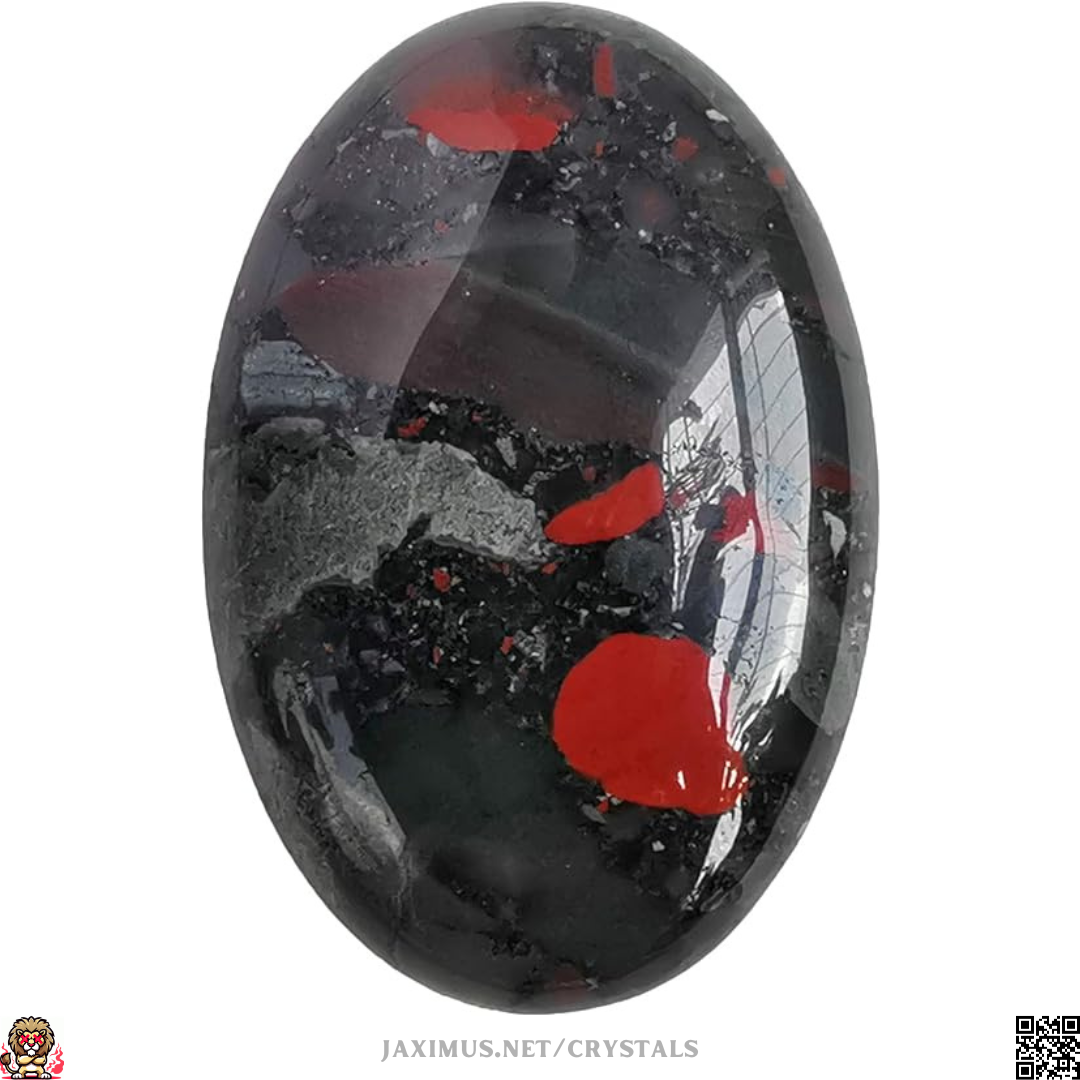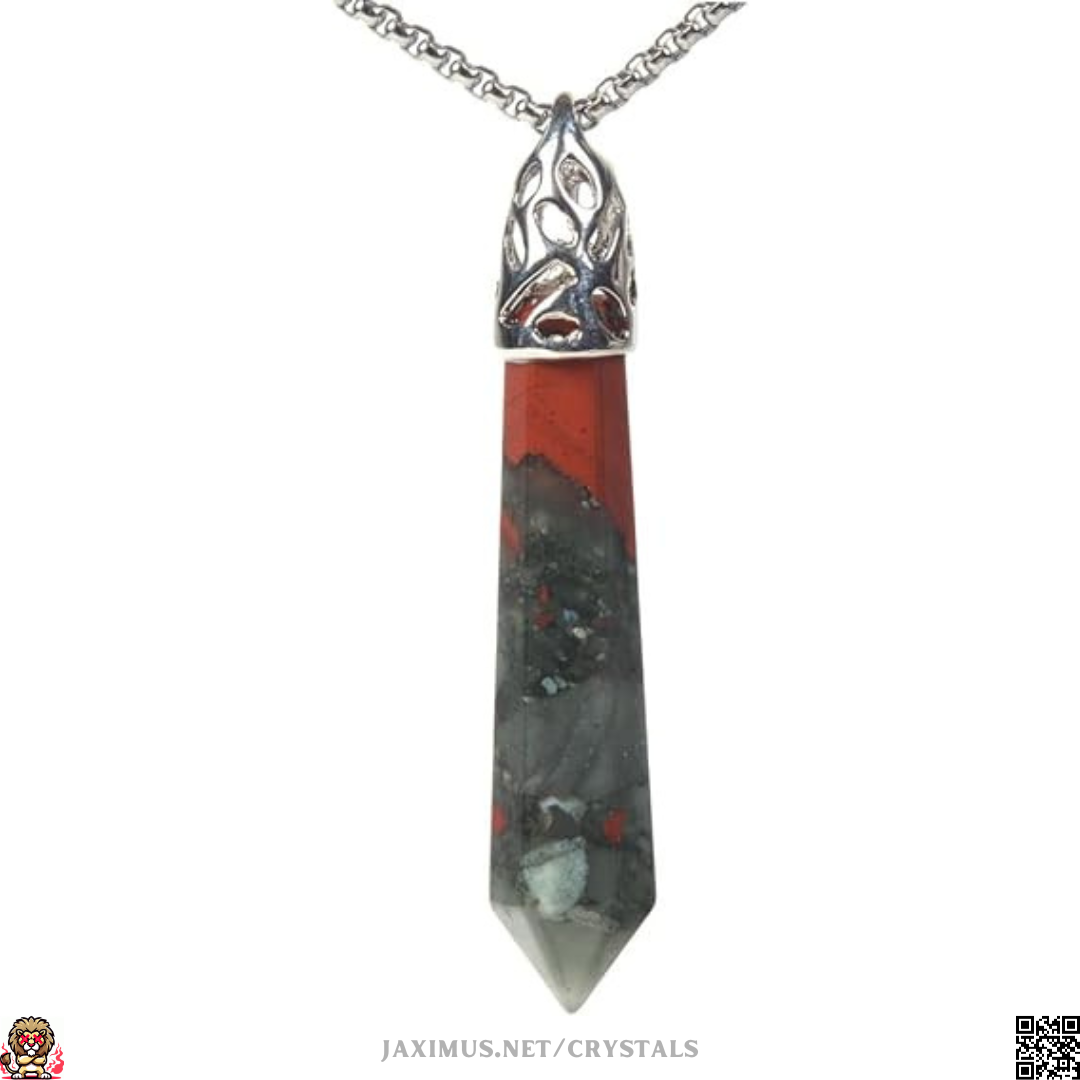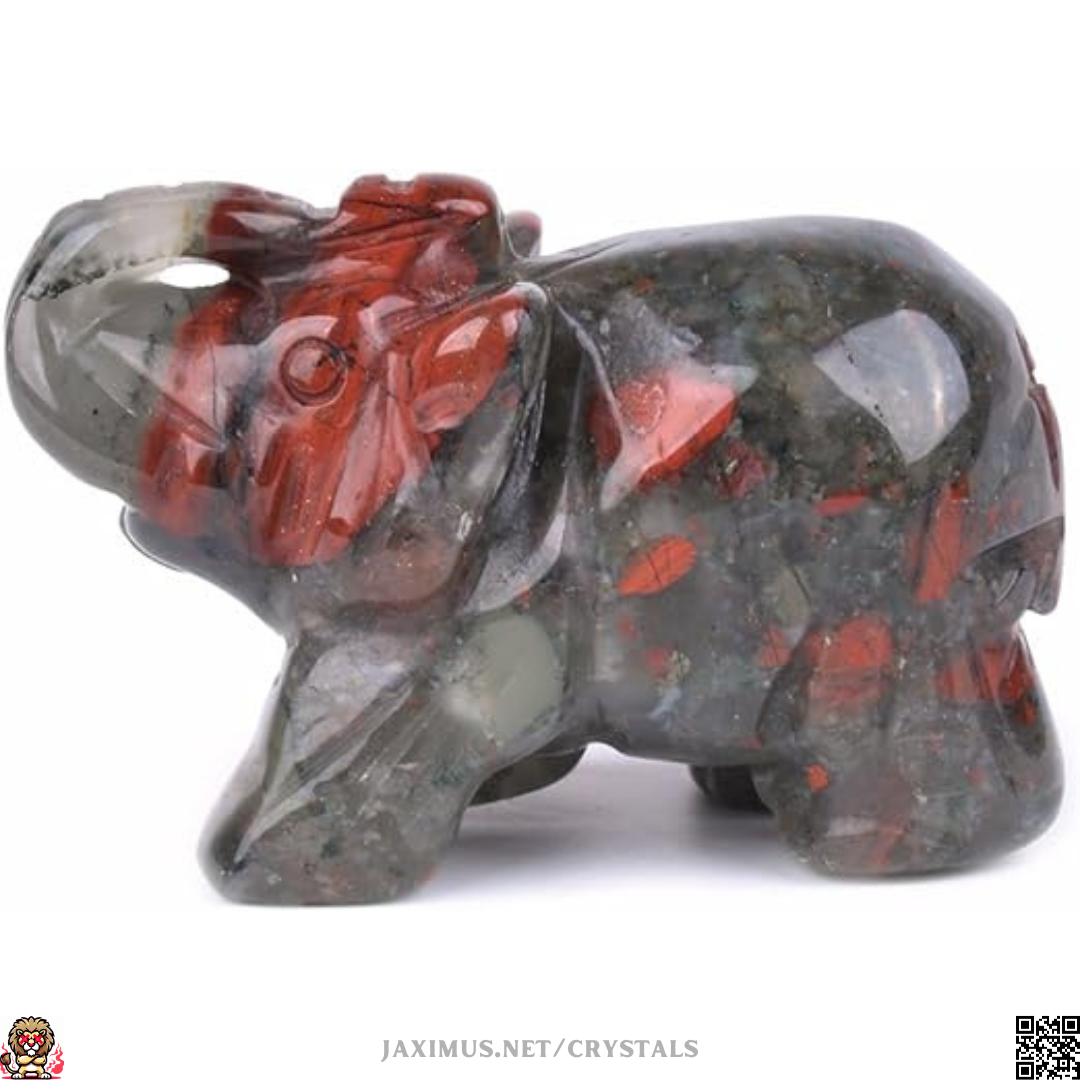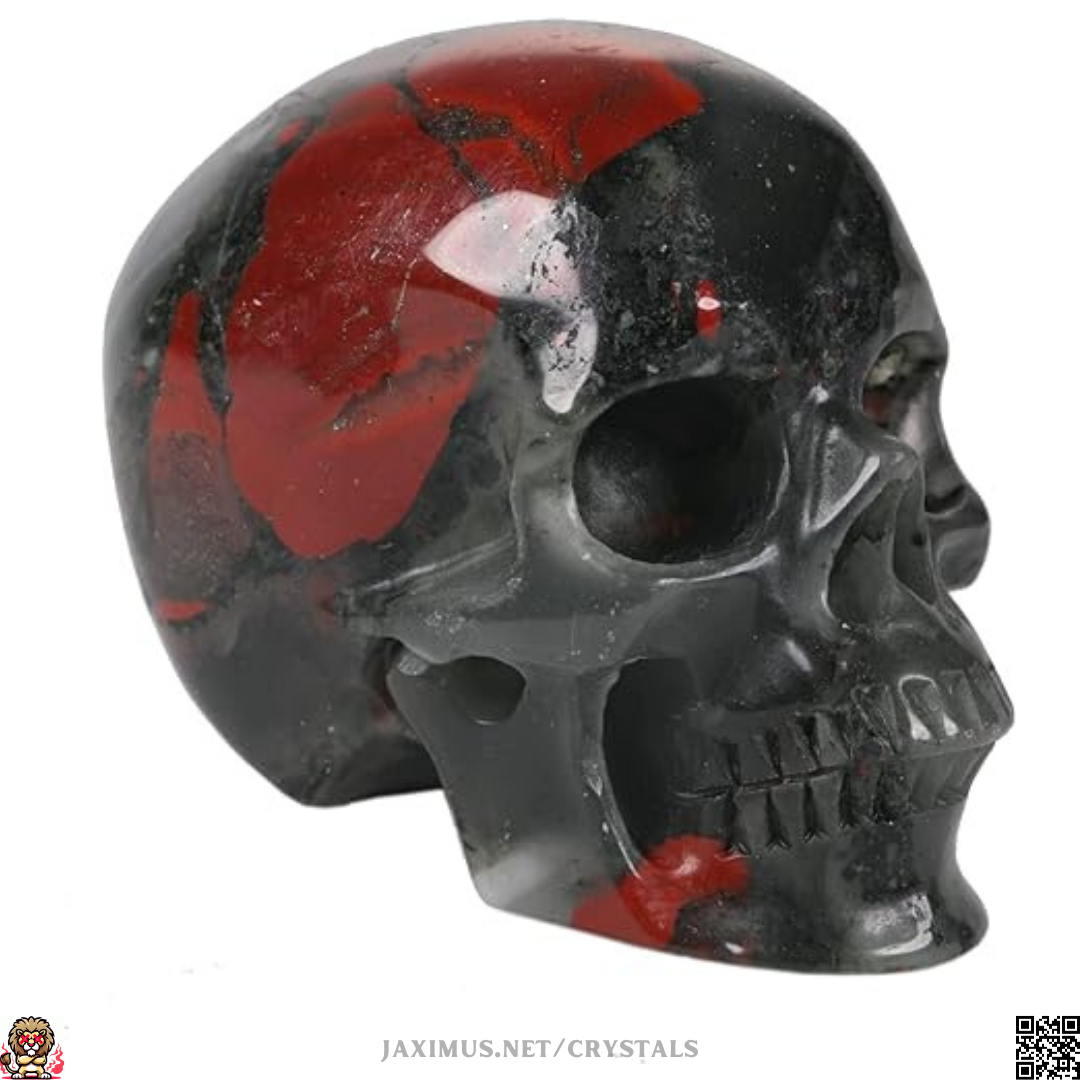African Bloodstone Unleashed: The Ultimate Guide to Healing Crystals
African Bloodstone, also known as African Heliotrope, is a type of chalcedony, which is a variety of quartz. It is characterized by its green color with red or brown spots, resembling drops of blood, hence the name “Bloodstone.” The green color is due to the presence of chlorite or other minerals, and the red or brown spots are often caused by the presence of iron oxides.
Table of Contents (Clickable!)

History of African Bloodstone
Bloodstone, including the African variety, has a rich history that dates back thousands of years. The stone has been revered and used for various purposes in different cultures. Here are some key points about the history of African Bloodstone:
- Ancient Use: Bloodstone has been used since ancient times for carving sculptures, amulets, and jewelry. It has been found in artifacts from ancient Babylon, Egypt, and Rome. The name “heliotrope,” another term for bloodstone, is derived from the ancient belief that the sun could cause the stone to turn red when placed in water.
- Symbolism in Christianity: Bloodstone has been associated with Christian religious themes. According to Christian legend, bloodstone formed when drops of Christ’s blood fell and stained jasper at the foot of the cross. The red spots in bloodstone were believed to represent these drops of blood, leading to the stone being considered sacred and protective.
- Healing and Protective Properties: In various cultures, including ancient Babylon and India, bloodstone was believed to have healing properties. It was thought to stop bleeding, purify the blood, and protect against negative energies. In traditional Chinese medicine, bloodstone was used for its supposed health benefits.
- Ancient Greek and Roman Beliefs: The ancient Greeks and Romans also valued bloodstone. They associated it with courage, strength, and the ability to withstand dangerous situations. Warriors often carried bloodstone amulets or wore them as jewelry for protection in battle.
- Medieval and Renaissance Periods: During the medieval and Renaissance periods, bloodstone continued to be valued for its protective properties. It was often engraved with symbols or scenes related to Christ’s crucifixion.
- Modern Usage: Today, African Bloodstone, like other varieties, is still used in jewelry and decorative items. Some individuals continue to believe in its metaphysical properties, associating it with vitality, courage, and protection.
Metaphysical Properties of African Bloodstone
- Courage and Strength: African Bloodstone is often associated with promoting courage and inner strength. It is believed to help individuals face challenges and overcome obstacles with resilience.
- Vitality and Energy: Some people believe that African Bloodstone has energizing properties and can help enhance vitality. It is thought to boost physical energy and stamina, making it popular among those seeking increased endurance.
- Blood Circulation: Due to its historical association with blood and its alleged ability to stop bleeding, some believe that African Bloodstone can have a positive impact on blood circulation and purification.
- Protection: In various traditions, African Bloodstone is considered a protective stone. It is believed to ward off negative energies and protect the wearer from harm. This protective quality is often associated with its historical use in amulets and talismans.
- Grounding and Balancing: Bloodstone is sometimes said to have grounding and balancing properties. It is thought to help individuals stay centered, focused, and connected to the Earth’s energies.
- Emotional Healing: African Bloodstone is believed by some to aid in emotional healing. It may be associated with promoting harmony, reducing stress, and encouraging a positive outlook.
- Creativity and Intuition: Some individuals use African Bloodstone to enhance creativity and intuition. It is thought to stimulate the flow of ideas and help individuals tap into their creative potential.

Physical Healing Properties of African Bloodstone
- Blood Circulation: Due to its historical association with blood and the belief in its ability to stop bleeding, some traditions suggest that African Bloodstone can have positive effects on blood circulation. However, there is no scientific evidence to support this claim.
- Detoxification: In metaphysical practices, African Bloodstone is sometimes believed to have detoxifying properties, supporting the body’s natural cleansing processes. Again, these claims lack scientific validation.
- Immune System Support: Some individuals may associate African Bloodstone with immune system support, believing that it can help strengthen the body’s defenses. However, there is no scientific basis for this belief.
- Reducing Stress: African Bloodstone is sometimes thought to have calming properties, which may be associated with stress reduction. This is more related to metaphysical or spiritual beliefs rather than scientifically proven effects.
Emotional Healing Properties of African Bloodstone
- Harmony and Balance: African Bloodstone is believed by some to have properties that promote emotional balance and harmony. It may be used to help individuals find equilibrium and navigate emotional challenges with a sense of stability.
- Stress Reduction: Like many other gemstones, African Bloodstone is often associated with reducing stress and promoting a sense of calm. It may be used as a tool for relaxation and emotional well-being.
- Courage and Confidence: The stone is sometimes linked to fostering courage and confidence. It may be used by individuals seeking to overcome fears, face challenges, and build self-assurance.
- Release of Negative Emotions: African Bloodstone is thought by some to help release negative emotions and unhealthy patterns of thought. It may be used as a symbolic tool for letting go of emotional baggage.
- Emotional Protection: In metaphysical traditions, African Bloodstone is associated with providing emotional protection. It may be used as a talisman to ward off negative energies and promote a sense of emotional security.
- Promotion of Creativity: Some individuals believe that African Bloodstone can stimulate creativity and enhance intuition. It may be used by those seeking inspiration or looking to tap into their artistic and imaginative side.

Chakra Associated with African Bloodstone
In various metaphysical traditions and belief systems, African Bloodstone is often associated with the heart chakra. The heart chakra, also known as Anahata in Sanskrit, is considered the center of love, compassion, and emotional well-being.
The heart chakra is believed to govern the energy related to love, relationships, empathy, and forgiveness. When working with gemstones in a chakra context, it is thought that the energy and properties of the stone can align with and support the corresponding chakra.
African Bloodstone’s association with the heart chakra is often linked to its perceived ability to bring balance and harmony, foster emotional healing, and promote qualities such as love and compassion. It is believed that using African Bloodstone in practices such as meditation or wearing it as jewelry can help open and align the heart chakra, facilitating a sense of emotional well-being.

Zodiac Associated with African Bloodstone
Gemstones are often associated with different zodiac signs based on traditions, beliefs, and interpretations of astrological influences. African Bloodstone is commonly linked to the zodiac sign Aries. Aries is typically associated with those born between March 21 and April 19.
African Bloodstone is believed to resonate with the energetic and assertive qualities associated with Aries. It is thought to complement the dynamic and adventurous nature of Aries individuals and may provide support in areas such as courage, vitality, and personal strength.
